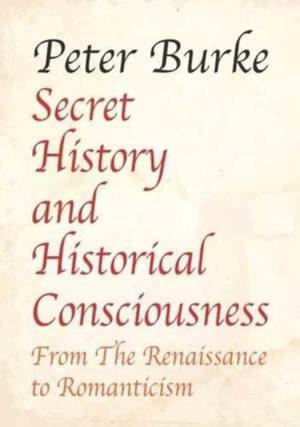
Bedankt voor het vertrouwen het afgelopen jaar! Om jou te bedanken bieden we GRATIS verzending (in België) aan op alles gedurende de hele maand januari.
- Afhalen na 1 uur in een winkel met voorraad
- In januari gratis thuislevering in België
- Ruim aanbod met 7 miljoen producten
Bedankt voor het vertrouwen het afgelopen jaar! Om jou te bedanken bieden we GRATIS verzending (in België) aan op alles gedurende de hele maand januari.
- Afhalen na 1 uur in een winkel met voorraad
- In januari gratis thuislevering in België
- Ruim aanbod met 7 miljoen producten
Zoeken
Secret History and Historical Consciousness
From Renaissance to Romanticism.
Peter Burke
Hardcover | Engels
€ 152,95
+ 305 punten
Omschrijving
The leading cultural historian Professor Peter Burke offers here several innovative approaches to cultural history. A key topic, from which the volume derives its name, is 'secret history', a phrase that came into use in the later seventeenth century to describe a new genre of historical writing by authors who claimed to be able to go behind the scenes and tell the public the real reasons for important events. The volume is introduced by an important autobiographical essay in which the author attempts to place his own career in its historical context. Professor Burke focusses on key topics that he believes to have been unjustly neglected, such as the rise of 'literal-mindedness' or the history of the idea of context. In the history of historical writing itself, one of these neglected topics is allegorical history - in other words, writing about the past in order to communicate a message about the present. The book ranges from the history of humour to the history of stereotypes (the 'Black Legend' of the Jesuits). Professor Burke studies the history of oral poetry, as well as changing conceptions of biography, linked to changing perceptions of individuals. He addresses pivotal issues and some familiar themes from unusual angles. These include the case of the anthropology and the geography of the Renaissance, and the study of postmodern views of history as myth, compared with the views of seventeenth-century sceptics.
Specificaties
Betrokkenen
- Auteur(s):
- Uitgeverij:
Inhoud
- Aantal bladzijden:
- 224
- Taal:
- Engels
Eigenschappen
- Productcode (EAN):
- 9781911204381
- Verschijningsdatum:
- 30/09/2016
- Uitvoering:
- Hardcover
- Formaat:
- Genaaid
- Afmetingen:
- 152 mm x 229 mm
- Gewicht:
- 498 g

Alleen bij Standaard Boekhandel
+ 305 punten op je klantenkaart van Standaard Boekhandel
Beoordelingen
We publiceren alleen reviews die voldoen aan de voorwaarden voor reviews. Bekijk onze voorwaarden voor reviews.









